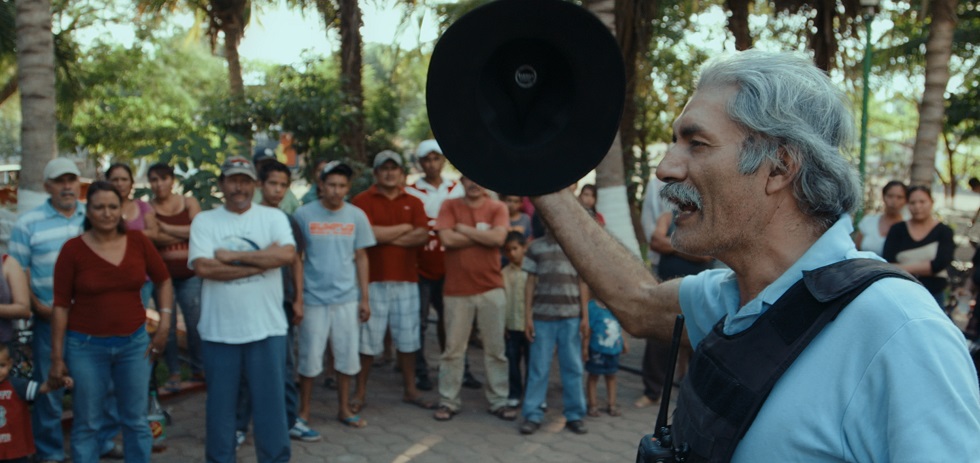Following two groups fighting against Mexican cartels – militant vigilantes patrolling the Arizona/Mexico border, and a Mexico-based anti-cartel militia – Matthew Heineman exposes the impact of ongoing cartel-led violence throughout a country with an embedded culture of underground drug-running, kidnapping and extortion. Embedding himself right in the heart of the Autodefensas, a community-driven militant group fighting to rid the region of the Knights Templar cartel, Heineman’s documentary is brave, captivating and proficient one, however, due to its construction in the editing room, the final outcome of the product comes across as ethically dubious.
Kicking off in Michoacán, a mid-sized region in southern Mexico, Cartel Land introduces us to Dr. Jose Mireles (known as “El Doctor”), an honourable man leading a militant community uprising against the Knights Templar cartel, circumventing the government channels that have failed to create any change in the region, riddled with corruption itself. We spend most of the film with the Autodefensas, kicking down doors, capturing and torturing Templar members, and watching as the movement fractures, developing into a sort of cartel operation itself. It’s a fascinating tale, though it is told with accompanying action-film music cues and fast cuts, rendering the violent shootouts we’re witness to as something akin to an action-thriller or war movie. The introduction of a counterpoint in Tim “Nailer” Foley – leader of an ex-military (note: often white-power affiliated) group of vigilante border patrol group Arizona Border Recon – doesn’t help shake this feeling, inserting a subplot that drives the film more into the realm of Sicario than it does Narco Cultura.
While it’s a strong concept for a film, and the level of exploration and exposure of hideous crime here is admirable, there are major problems arising from Heineman’s time in the editing room, most obvious in the questionable choice to frame his documentary through the lens of the modern action-thriller. Upon reflection, it’s a stomach-churning move that cheapens the impact of the palpable human suffering on display, turning acts of violence and abuse into spectacle, bearing far less impact than the purely exploratory Narco Cultura that came before it. There’s also no real attempt to tackle the systematic causes of such problems beyond a surface level, never placing the blame on the drug-addicted first world for problems of violence across international borders, instead focusing near solely on a lack of government action and rampant corruption in one location.
In saying that it is by no means a lacklustre film; Heineman’s footage is absolutely heartstopping, the pacing is perfect, and the story is proficiently told – it certainly packs a punch, but not the sort of punch this documentary provides. The audience should feel upset because the content is deeply affecting on its own, driven to lobby for political and social change. Instead, the ending signals a relief of tension as we’ve been taken on a ride through the tropes of an action film. Heineman is an expert filmmaker, and Cartel Land is sure to reach a wide audience, but its presentation works to please the blockbuster fan inside of all of us, rather than drive us to action.
It should be mentioned that this film is not for the faint of heart; there is footage of beatings, shootings, torture, the mutilated bodies of victims of extortion, and a heap of horrifying footage circulated by the cartels themselves. Heineman doesn’t shy away from the raw brutality of the whole situation which is commendable in some senses, but feels cheap considering the approach to assembly. In fact, it’s surprising to find that Heineman’s previous effort was a documentary advocating for healthcare reform in the United States, given that one could mistake Cartel Land for Conservative/Libertarian propaganda, advocating dropping off the grid to fight our own wars against a government who legislate for themselves rather than the people and create the conditions that allow the prevalence of widespread atrocities.
While Heineman’s film is an interesting experiment, with pulse-pounding action throughout, its morally objectifiable construction makes it a too hard to recommend in good faith. It is surely a strong film, and one that needs to be made again and again until the world wakes up to the true situation across the Mexican border – if we want to truly tackle the systematically reinforced culture of drug-running, violence and extortion in Mexico – however this isn’t the way to go about it, lacking the right sort of punch to enact change, instead positioning itself alongside pulse-pounding thrillers like The Kingdom, Sicario, and The Hurt Locker.

